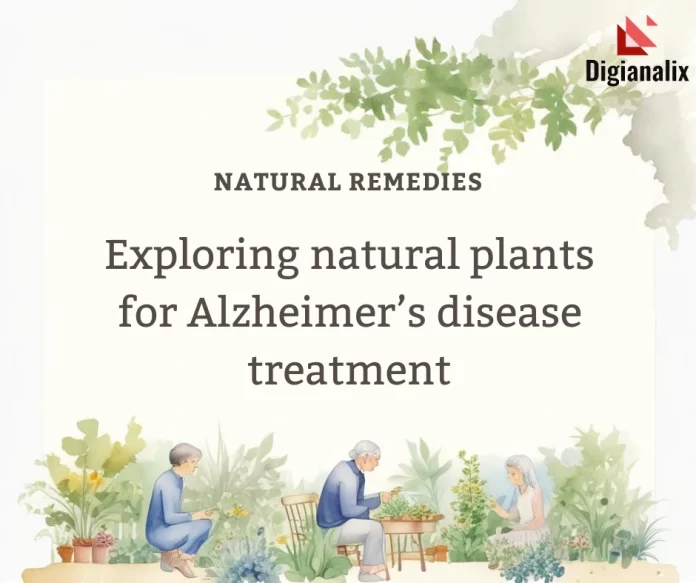Introduction
Alzheimer’s Disease (AD) is a progressive neurodegenerative disorder and the most common cause of dementia in the elderly. Characterized by memory loss, cognitive decline, and impaired reasoning, AD affects millions of individuals worldwide, particularly those over 65. While conventional treatments aim to manage symptoms, they offer limited disease-modifying effects.
Emerging research emphasizes the role of natural medicinal plants and lifestyle factors in slowing aging and preventing Alzheimer’s Disease. This article explores the mechanisms behind AD, the impact of aging, and how natural remedies may offer new hope for prevention and management.
Understanding Alzheimer’s Disease: Causes and Pathophysiology
1. Formation of Plaques and Tangles
- Amyloid plaques: Abnormal deposits of beta-amyloid protein in the brain, disrupting neuron communication.
- Neurofibrillary tangles (NFTs): Twisted strands of tau protein that block nutrient transport in neurons, leading to cell death.
2. Cholinergic Hypothesis
- Loss of acetylcholine (ACh)-producing neurons affects cognitive function.
- Reduced ACh levels disrupt synaptic transmission, contributing to memory loss.
3. Amyloid Hypothesis
- Imbalance in the production and clearance of amyloid beta (Aβ42) peptides leads to plaque formation, neuron toxicity, and inflammation.
4. Oxidative Stress and Inflammation
- Excessive free radicals and chronic inflammation accelerate neuron damage and cognitive decline.
Epidemiology of Alzheimer’s Disease
- Global prevalence of dementia was 43.8 million in 2016, with projections reaching 150 million by 2050.
- Incidence doubles every 5 years after 65.
- Women over 85 have a higher risk than men.
Natural Medicinal Plants for Aging and Alzheimer’s Prevention
Several medicinal plants offer neuroprotective benefits through antioxidant, anti-inflammatory, and cognitive-enhancing properties.
1. Ginkgo Biloba
- Family: Ginkgoaceae
- Benefits: Improves memory, cognitive function, and brain circulation.
- Mechanism: Protects neurons, reduces oxidative stress, and enhances neurotransmission.
2. Turmeric (Curcuma longa)
- Family: Zingiberaceae
- Benefits: Contains Curcumin, an anti-inflammatory and antioxidant compound.
- Mechanism: Reduces amyloid plaque deposition and oxidative stress.
3. Ashwagandha (Withania somnifera)
- Family: Solanaceae
- Benefits: Reduces stress, enhances cognitive function, and acts as an adaptogen.
- Mechanism: Lowers oxidative stress, supports neuron regeneration, and exhibits anti-aging effects.
4. Green Tea (Camellia sinensis)
- Family: Theaceae
- Benefits: Rich in polyphenols and catechins, supports brain health.
- Mechanism: Antioxidant action reduces neuron damage and supports cognition.
5. Ginger (Zingiber officinale)
- Family: Zingiberaceae
- Benefits: Anti-inflammatory, improves cognitive function.
- Mechanism: Reduces brain inflammation, combats oxidative stress.
6. Rosemary (Rosmarinus officinalis)
- Family: Lamiaceae
- Benefits: Enhances memory and concentration.
- Mechanism: Antioxidant and neuroprotective properties boost brain function.
Lifestyle and Dietary Considerations for Healthy Aging and Brain Health
1. Mediterranean Diet
- Rich in fruits, vegetables, whole grains, olive oil, and fish.
- High in antioxidants and anti-inflammatory compounds that protect the brain.
2. Intermittent Fasting
- Stimulates autophagy, a cellular cleaning process that removes damaged cells and proteins.
- May prevent amyloid plaque accumulation.
3. Regular Exercise
- Enhances blood flow to the brain, reduces inflammation, and promotes neurogenesis.
- Recommended: 150 minutes of moderate activity per week.
4. Quality Sleep
- 7-8 hours of sleep supports brain detoxification and memory consolidation.
- Poor sleep increases AD risk.
5. Stress Management
- Chronic stress accelerates brain aging.
- Techniques: Yoga, meditation, deep breathing to reduce cortisol levels.
The Gut-Brain Axis in Alzheimer’s and Aging
- The gut microbiome influences brain health through inflammation regulation and neurotransmitter production.
- Dysbiosis (imbalance in gut bacteria) is linked to increased AD risk.
- Probiotics, prebiotics, and herbal supplements can improve gut-brain communication and support cognitive health.
Conclusion
Alzheimer’s disease, deeply linked with aging, involves complex interactions of oxidative stress, inflammation, and genetic predisposition. While modern medicine has yet to find a cure, natural medicinal plants like Ginkgo Biloba, Turmeric, and Ashwagandha provide promising neuroprotective effects. Combined with lifestyle strategies such as diet, exercise, and stress management, these natural remedies offer a holistic approach to aging healthily and reducing Alzheimer’s risk.
Future research on natural compounds and lifestyle interventions will enhance our understanding of brain aging and offer novel preventive and therapeutic options.
-By – Jyoti Kumari Gope, Varsha Kumari (Digianalix)
References
- Kumar, A., Sidhu, J., Lui, F., Tsao, J.W. (2024). Alzheimer Disease. StatPearls Publishing. NCBI
- Rao, R.V., Descamps, O., John, V., Bredesen, D.E. (2012). Ayurvedic medicinal plants for Alzheimer’s disease: a review. Alzheimer’s Research & Therapy, 4(3), 1-9. Nature
- Monteiro, A.R., Barbosa, D.J., Remião, F., Silva, R. (2023). Alzheimer’s disease: Insights and new prospects in disease pathophysiology. Biochemical Pharmacology, 211, 115522. ScienceDirect
- Mathuranath, P.S., George, A., Ranjith, N., et al. (2012). Incidence of Alzheimer’s disease in India: A 10-year follow-up study. Neurology India, 60(6), 625-630. PMC
- Schachter, A.S., Davis, K.L. (2000). Alzheimer’s disease. Dialogues in Clinical Neuroscience, 2(2), 91-100. PMC
📌 Explore more on brain health and medicinal plants at Digianalix!




